#Devops on azure
Explore tagged Tumblr posts
Text
What is DevOps on Azure? Software Development Streamlining Platform | OpsNexa!
Learn about Azure DevOps, Microsoft's portfolio of tools for managing the whole software development lifecycle. From continuous integration and delivery (CI/CD) to project management, What is DevOps Azure, testing, and version control, Azure DevOps provides everything development teams need to communicate effectively and produce high-quality software faster. Learn about its core features, benefits, and how it helps teams streamline operations and increase productivity.
#What is azure devops#Azure devops explained#Devops on azure#Azure devops services#Azure ci cd#Microsoft devops
0 notes
Text
Abathur

At Abathur, we believe technology should empower, not complicate.
Our mission is to provide seamless, scalable, and secure solutions for businesses of all sizes. With a team of experts specializing in various tech domains, we ensure our clients stay ahead in an ever-evolving digital landscape.
Why Choose Us? Expert-Led Innovation – Our team is built on experience and expertise. Security First Approach – Cybersecurity is embedded in all our solutions. Scalable & Future-Proof – We design solutions that grow with you. Client-Centric Focus – Your success is our priority.
#Software Development#Web Development#Mobile App Development#API Integration#Artificial Intelligence#Machine Learning#Predictive Analytics#AI Automation#NLP#Data Analytics#Business Intelligence#Big Data#Cybersecurity#Risk Management#Penetration Testing#Cloud Security#Network Security#Compliance#Networking#IT Support#Cloud Management#AWS#Azure#DevOps#Server Management#Digital Marketing#SEO#Social Media Marketing#Paid Ads#Content Marketing
2 notes
·
View notes
Text
Copilot Use Cases For Developers
Microsoft Copilot is revolutionizing the way developers interact with development tools, providing AI-powered assistance across a range of Microsoft products like Visual Studio, Azure, and GitHub. With Copilot integrated into these environments, developers can streamline workflows, automate routine tasks, and leverage advanced features for improved productivity. For example, in Visual Studio, Copilot helps write code faster by suggesting context-aware completions, refactoring code, and even generating entire functions based on brief descriptions. This drastically reduces the time spent on boilerplate code and increases efficiency, allowing developers to focus on more creative and complex aspects of their projects.
Furthermore, Microsoft Copilot empowers developers to work smarter by integrating with cloud-based services like Azure. By leveraging machine learning and AI, it can suggest optimized solutions, recommend cloud resources, and assist in troubleshooting infrastructure issues. This level of automation and intelligent support enables developers to make better decisions quickly, while reducing the cognitive load and manual effort needed to manage cloud-based applications. As Microsoft Copilot continues to evolve, it will increasingly become an indispensable tool in the developer toolkit, transforming how software is built and deployed in today’s fast-paced technological landscape.
Click Here to know more: https://www.intelegain.com/top-10-copilot-use-cases-in-2025/
#MicrosoftCopilot#AIForDevelopers#DevTools#ProductivityBoost#CodeCompletion#CloudDevelopment#VisualStudio#Azure#MachineLearning#AutomatedCoding#SoftwareDevelopment#TechInnovation#DeveloperEfficiency#AIinTech#DevOps
2 notes
·
View notes
Text
A Comprehensive Guide to Deploy Azure Kubernetes Service with Azure Pipelines

A powerful orchestration tool for containerized applications is one such solution that Azure Kubernetes Service (AKS) has offered in the continuously evolving environment of cloud-native technologies. Associate this with Azure Pipelines for consistent CI CD workflows that aid in accelerating the DevOps process. This guide will dive into the deep understanding of Azure Kubernetes Service deployment with Azure Pipelines and give you tips that will enable engineers to build container deployments that work. Also, discuss how DevOps consulting services will help you automate this process.
Understanding the Foundations
Nowadays, Kubernetes is the preferred tool for running and deploying containerized apps in the modern high-speed software development environment. Together with AKS, it provides a high-performance scale and monitors and orchestrates containerized workloads in the environment. However, before anything, let’s deep dive to understand the fundamentals.
Azure Kubernetes Service: A managed Kubernetes platform that is useful for simplifying container orchestration. It deconstructs the Kubernetes cluster management hassles so that developers can build applications instead of infrastructure. By leveraging AKS, organizations can:
Deploy and scale containerized applications on demand.
Implement robust infrastructure management
Reduce operational overhead
Ensure high availability and fault tolerance.
Azure Pipelines: The CI/CD Backbone
The automated code building, testing, and disposition tool, combined with Azure Kubernetes Service, helps teams build high-end deployment pipelines in line with the modern DevOps mindset. Then you have Azure Pipelines for easily integrating with repositories (GitHub, Repos, etc.) and automating the application build and deployment.
Spiral Mantra DevOps Consulting Services
So, if you’re a beginner in DevOps or want to scale your organization’s capabilities, then DevOps consulting services by Spiral Mantra can be a game changer. The skilled professionals working here can help businesses implement CI CD pipelines along with guidance regarding containerization and cloud-native development.
Now let’s move on to creating a deployment pipeline for Azure Kubernetes Service.
Prerequisites you would require
Before initiating the process, ensure you fulfill the prerequisite criteria:
Service Subscription: To run an AKS cluster, you require an Azure subscription. Do create one if you don’t already.
CLI: The Azure CLI will let you administer resources such as AKS clusters from the command line.
A Professional Team: You will need to have a professional team with technical knowledge to set up the pipeline. Hire DevOps developers from us if you don’t have one yet.
Kubernetes Cluster: Deploy an AKS cluster with Azure Portal or ARM template. This will be the cluster that you run your pipeline on.
Docker: Since you’re deploying containers, you need Docker installed on your machine locally for container image generation and push.
Step-by-Step Deployment Process
Step 1: Begin with Creating an AKS Cluster
Simply begin the process by setting up an AKS cluster with CLI or Azure Portal. Once the process is completed, navigate further to execute the process of application containerization, and for that, you would need to create a Docker file with the specification of your application runtime environment. This step is needed to execute the same code for different environments.
Step 2: Setting Up Your Pipelines
Now, the process can be executed for new projects and for already created pipelines, and that’s how you can go further.
Create a New Project
Begin with launching the Azure DevOps account; from the screen available, select the drop-down icon.
Now, tap on the Create New Project icon or navigate further to use an existing one.
In the final step, add all the required repositories (you can select them either from GitHub or from Azure Repos) containing your application code.
For Already Existing Pipeline
Now, from your existing project, tap to navigate the option mentioning Pipelines, and then open Create Pipeline.
From the next available screen, select the repository containing the code of the application.
Navigate further to opt for either the YAML pipeline or the starter pipeline. (Note: The YAML pipeline is a flexible environment and is best recommended for advanced workflows.).
Further, define pipeline configuration by accessing your YAML file in Azure DevOps.
Step 3: Set Up Your Automatic Continuous Deployment (CD)
Further, in the next step, you would be required to automate the deployment process to fasten the CI CD workflows. Within the process, the easiest and most common approach to execute the task is to develop a YAML file mentioning deployment.yaml. This step is helpful to identify and define the major Kubernetes resources, including deployments, pods, and services.
After the successful creation of the YAML deployment, the pipeline will start to trigger the Kubernetes deployment automatically once the code is pushed.
Step 4: Automate the Workflow of CI CD
Now that we have landed in the final step, it complies with the smooth running of the pipelines every time the new code is pushed. With the right CI CD integration, the workflow allows for the execution of continuous testing and building with the right set of deployments, ensuring that the applications are updated in every AKS environment.
Best Practices for AKS and Azure Pipelines Integration
1. Infrastructure as Code (IaC)
- Utilize Terraform or Azure Resource Manager templates
- Version control infrastructure configurations
- Ensure consistent and reproducible deployments
2. Security Considerations
- Implement container scanning
- Use private container registries
- Regular security patch management
- Network policy configuration
3. Performance Optimization
- Implement horizontal pod autoscaling
- Configure resource quotas
- Use node pool strategies
- Optimize container image sizes
Common Challenges and Solutions
Network Complexity
Utilize Azure CNI for advanced networking
Implement network policies
Configure service mesh for complex microservices
Persistent Storage
Use Azure Disk or Files
Configure persistent volume claims
Implement storage classes for dynamic provisioning
Conclusion
Deploying the Azure Kubernetes Service with effective pipelines represents an explicit approach to the final application delivery. By embracing these practices, DevOps consulting companies like Spiral Mantra offer transformative solutions that foster agile and scalable approaches. Our expert DevOps consulting services redefine technological infrastructure by offering comprehensive cloud strategies and Kubernetes containerization with advanced CI CD integration.
Let’s connect and talk about your cloud migration needs
2 notes
·
View notes
Text
#Azure#MicrosoftAzure#CloudComputing#DigitalTransformation#Cybersecurity#DevOps#MicrosoftPartner#MSPartner#Microsoft365#AI
2 notes
·
View notes
Text
Secure and Scalable Cloud Server Management at Atcuality
For businesses seeking to enhance scalability and maintain top-tier security, Atcuality provides unparalleled cloud server management services. Our solutions cover all aspects of cloud server maintenance, including load balancing, patch management, data backups, and disaster recovery planning. Our experienced professionals work with cutting-edge tools to ensure that your servers are secure, efficient, and scalable to meet changing business needs. Whether you operate in e-commerce, finance, or technology, we tailor our services to align with your operational goals. With Atcuality as your trusted partner, you can focus on driving growth while we handle the technical complexities of cloud management.
#seo marketing#seo services#artificial intelligence#azure cloud services#seo agency#digital marketing#seo company#iot applications#ai powered application#amazon web services#ai applications#virtual reality#augmented reality agency#augmented human c4 621#augmented and virtual reality market#augmented intelligence#augmented reality#cloud security services#cloud computing#cloud services#cloud service provider#cloud server hosting#software#devops#information technology#cash collection application#task management#blockchain#web developing company#web development
2 notes
·
View notes
Text

🚀 Join Us TODAY for an Exclusive Azure DevOps Demo! 🚀
💡 Ready to boost your DevOps skills? Learn about Azure DevOps in our hands-on online demo TODAY at eMexo Technologies! 🎓🔥 PLUS, we're offering an incredible 40% OFF for a limited time! 💥
📅 Don't Miss Out – The clock is ticking! ⏳ Gain real-world insights and start your journey to becoming a DevOps pro! 🛠️
👉 CLICK THE LINK https://www.emexotechnologies.com/courses/microsoft-azure-devops-training-course-az-400/ to secure your spot NOW! 💻✨
📅 25th Sept 2024 🧭 9 PM ( IST )
Format: Online Training
Contact Us For More Info:
📞 Phone: +91 9513216462
🌐 Website: https://www.emexotechnologies.com/
#azure devops#azure training#devops#cloud computing training#emexotechnologies#bangalore#electroniccity#traininginstitute#e learning#online courses#online training#tech education#tech skills#software training institute
2 notes
·
View notes
Text

Growth is exciting, but only if your app can handle it! Cloud technology ensures your app scales effortlessly to meet increasing demand. 📈 Get ready for success! 🔗Learn more: https://greyspacecomputing.com/custom-mobile-application-development-services/ 📧 Visit: https://greyspacecomputing.com/portfolio
#GreySpaceComputing#CloudTech#AppScalability#cloudcomputing#cloud#technology#cybersecurity#aws#bigdata#devops#it#datacenter#azure#cloudstorage#linux#programming#software#tech#iot#cloudservices#coding#cloudsecurity#machinelearning#informationtechnology#datascience#business#python#security#microsoft#dataprotection
2 notes
·
View notes
Text
Uncover the power of AWS with our carousel of key findings! Dive into essential AWS statistics and unlock insights you didn't know you needed.



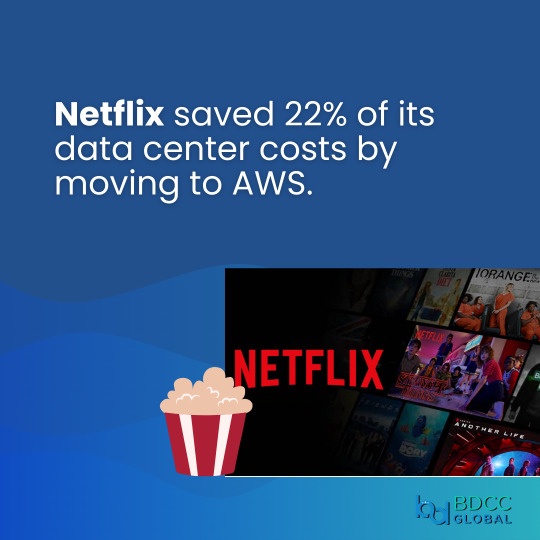
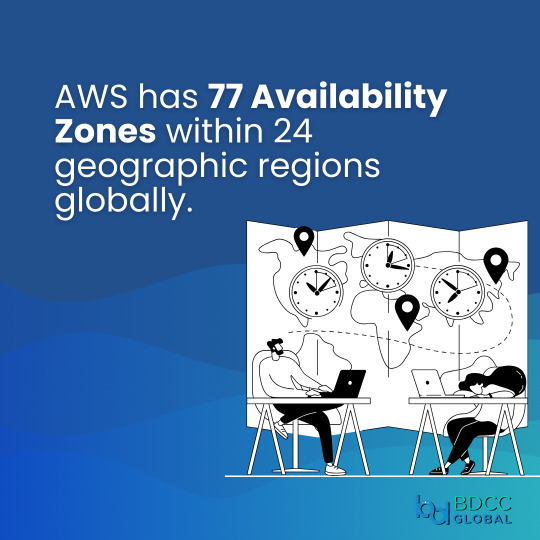
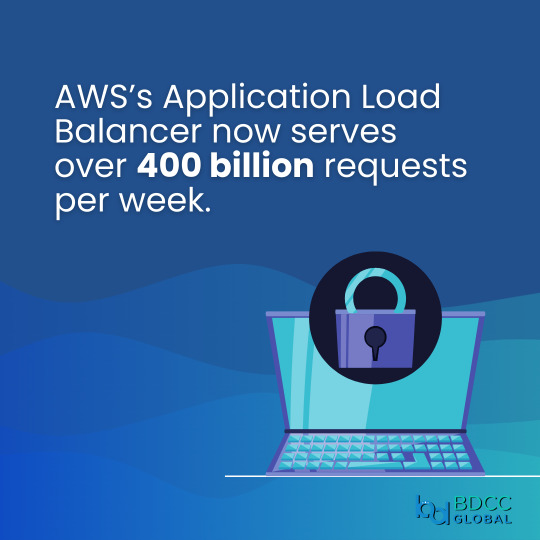
4 notes
·
View notes
Text
Azure DevOps Training
Azure DevOps Training Programs

In today's rapidly evolving tech landscape, mastering Azure DevOps has become indispensable for organizations aiming to streamline their software development and delivery processes. As businesses increasingly migrate their operations to the cloud, the demand for skilled professionals proficient in Azure DevOps continues to soar. In this comprehensive guide, we'll delve into the significance of Azure DevOps training and explore the myriad benefits it offers to both individuals and enterprises.
Understanding Azure DevOps:
Before we delve into the realm of Azure DevOps training, let's first grasp the essence of Azure DevOps itself. Azure DevOps is a robust suite of tools offered by Microsoft Azure that facilitates collaboration, automation, and orchestration across the entire software development lifecycle. From planning and coding to building, testing, and deployment, Azure DevOps provides a unified platform for managing and executing diverse DevOps tasks seamlessly.
Why Azure DevOps Training Matters:
With Azure DevOps emerging as the cornerstone of modern DevOps practices, acquiring proficiency in this domain has become imperative for IT professionals seeking to stay ahead of the curve. Azure DevOps training equips individuals with the knowledge and skills necessary to leverage Microsoft Azure's suite of tools effectively. Whether you're a developer, IT administrator, or project manager, undergoing Azure DevOps training can significantly enhance your career prospects and empower you to drive innovation within your organization.
Key Components of Azure DevOps Training Programs:
Azure DevOps training programs are meticulously designed to cover a wide array of topics essential for mastering the intricacies of Azure DevOps. From basic concepts to advanced techniques, these programs encompass the following key components:
Azure DevOps Fundamentals: An in-depth introduction to Azure DevOps, including its core features, functionalities, and architecture.
Agile Methodologies: Understanding Agile principles and practices, and how they align with Azure DevOps for efficient project management and delivery.
Continuous Integration (CI): Learning to automate the process of integrating code changes into a shared repository, thereby enabling early detection of defects and ensuring software quality.
Continuous Deployment (CD): Exploring the principles of continuous deployment and mastering techniques for automating the deployment of applications to production environments.
Azure Pipelines: Harnessing the power of Azure Pipelines for building, testing, and deploying code across diverse platforms and environments.
Infrastructure as Code (IaC): Leveraging Infrastructure as Code principles to automate the provisioning and management of cloud resources using tools like Azure Resource Manager (ARM) templates.
Monitoring and Logging: Implementing robust monitoring and logging solutions to gain insights into application performance and troubleshoot issues effectively.
Security and Compliance: Understanding best practices for ensuring the security and compliance of Azure DevOps environments, including identity and access management, data protection, and regulatory compliance.
The Benefits of Azure DevOps Certification:
Obtaining Azure DevOps certification not only validates your expertise in Azure DevOps but also serves as a testament to your commitment to continuous learning and professional development. Azure DevOps certifications offered by Microsoft Azure are recognized globally and can open doors to exciting career opportunities in various domains, including cloud computing, software development, and DevOps engineering.
Conclusion:
In conclusion, Azure DevOps training is indispensable for IT professionals looking to enhance their skills and stay relevant in today's dynamic tech landscape. By undergoing comprehensive Azure DevOps training programs and obtaining relevant certifications, individuals can unlock a world of opportunities and propel their careers to new heights. Whether you're aiming to streamline your organization's software delivery processes or embark on a rewarding career journey, mastering Azure DevOps is undoubtedly a game-changer. So why wait? Start your Azure DevOps training journey today and pave the way for a brighter tomorrow.
5 notes
·
View notes
Text
Top FAQs about Azure DevOps Consulting

The complexity of modern software development is overwhelming you, don't you think? Do you want to increase output and simplify your processes? Azure DevOps can assist! To help you understand how Azure DevOps consulting can help your business, this blog article answers the most common questions regarding it.
Here are the key factors: ➡️ You can create automated testing and deployment pipelines, train your teams on best practices, and set up and configure DevOps services with the assistance of Azure DevOps specialists.
➡️ Businesses encounter difficulties with integration, security issues, and cultural opposition to change. You can overcome these obstacles by using consulting services.
➡️ Security is a top priority, and to guarantee compliance, consultants integrate security principles into your development pipeline.
➡️ It uses several features to optimize CI/CD pipelines for scalability and performance, and integrates with other tools.
Azure DevOps consulting might be a great help if you're trying to start from scratch or improve your current DevOps procedures.
Are you prepared to find out more? For a more thorough discussion of these subjects, visit the blog post!
4 notes
·
View notes
Text
youtube
The Best DevOps Development Team in India | Boost Your Business with Connect Infosoft
Please Like, Share, Subscribe, and Comment to us.
Our experts are pros at making DevOps work seamlessly for businesses big and small. From making things run smoother to saving time with automation, we've got the skills you need. Ready to level up your business?
#connectinfosofttechnologies#connectinfosoft#DevOps#DevOpsDevelopment#DevOpsService#DevOpsTeam#DevOpsSolutions#DevOpsCompany#DevOpsDeveloper#CloudComputing#CloudService#AgileDevOps#ContinuousIntegration#ContinuousDelivery#InfrastructureAsCode#Automation#Containerization#Microservices#CICD#DevSecOps#CloudNative#Kubernetes#Docker#AWS#Azure#GoogleCloud#Serverless#ITOps#TechOps#SoftwareDevelopment
2 notes
·
View notes
Text
Google Cloud Professional Cloud Architect Certification. Become a GCP Cloud Architect, Latest GCP Exam and Case Studies.
Google Cloud Platform is one of the fastest-growing cloud service platforms offered today that lets you run your applications and data workflows at a 'Google-sized' scale.
Google Cloud Certified Professional Cloud Architect certification is one of the most highly desired IT certifications out today. It is also one of the most challenging exams offered by any cloud vendor today. Passing this exam will take many hours of study, hands-on experience, and an understanding of a very wide range of GCP topics.
Luckily, we're here to help you out! This course is designed to be your best single resource to prepare for and pass the exam to become a certified Google Cloud Architect.
Why should do a Google Cloud Certification?
Here are few results from Google's 2020 Survey:
89% of Google Cloud certified individuals are more confident about their cloud skills
GCP Cloud Architect was the highest paying certification of 2020 (2) and 2019 (3)
More than 1 in 4 of Google Cloud certified individuals took on more responsibility or leadership roles at work
Why should you aim for Google Cloud - GCP Cloud Architect Certification?
Google Cloud Professional Cloud Architect certification helps you gain an understanding of cloud architecture and Google Cloud Platform.
As a Cloud Architect, you will learn to design, develop, and manage robust, secure, scalable, highly available, and dynamic solutions to drive business objectives.
The Google Cloud Certified - Professional Cloud Architect exam assesses your ability to:
Design and architect a GCP solution architecture
Manage and provision the GCP solution infrastructure
Design for security and compliance
Analyze and optimize technical and business processes
Manage implementations of Google Cloud architecture
Ensure solution and operations reliability
Are you ready to get started on this amazing journey to becoming a Google Cloud Architect?
So let's get started!
Who this course is for:
You want to start your Cloud Journey with Google Cloud Platform
You want to become a Google Cloud Certified Professional Cloud Architect
#googlecloud#aws#cloud#cloudcomputing#azure#google#googlepixel#technology#machinelearning#awscloud#devops#bigdata#python#coding#googlecloudplatform#cybersecurity#gcp#developer#microsoft#linux#datascience#tech#microsoftazure#programming#amazonwebservices#amazon#software#pixel#xl#azurecloud
5 notes
·
View notes
Text
Power Bi Online in Washington - Stratada
Can you use Power BI online?
Absolutely, you can use Power BI online through the Power BI service, which is a cloud-based platform provided by Microsoft. This service allows users to create, collaborate on, and share interactive data visualizations and reports.
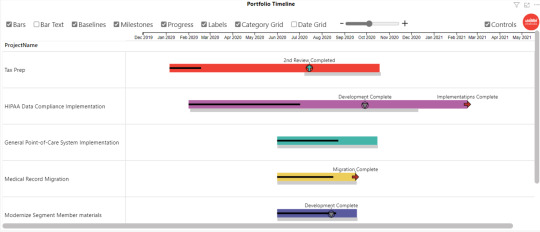
Through Power BI online, you can:
Create Reports: Import data, create data models, and design interactive reports using various visualizations.
Publish and Share: Publish your reports and dashboards to share them securely with others within your organization or publicly, if preferred.
Collaborate: Collaborate with colleagues by sharing reports, dashboards, and datasets, allowing for real-time collaboration and commenting.
Access from Anywhere: Since it's cloud-based, you can access Power BI online from any device with an internet connection.
Manage Data: Manage and refresh datasets, schedule data refreshes, and keep your reports up-to-date.
The Power BI service also offers various additional features like AI-powered insights, natural language querying, and integration with other Microsoft services like Azure, Excel, and more.
It's a powerful tool for data analysis, visualization, and sharing insights across teams or organizations.
#Power Bi Smartsheet#Azure Devops Gantt Chart#Power Bi Jira Dashboard#Jira Custom Chart#Power Bi Scatter Chart#Power Bi Drill Through#Power Bi Online
2 notes
·
View notes
Text
Choose the Right Azure DevOps Services For Your Needs

To compete in today's business landscape, having a hold on the right tools with major technological trends is a way to achieve excellence and growth. Azure DevOps provides a solid programmable framework for easing software development in this trait. Whether managing a small project or working on more elaborate enterprise-scale workflows, choosing the right Azure DevOps services can mean the difference between the successful management of your operations or deadlock. Through this article, let’s get deeper to understand what Azure DevOps stands for and how Spiral Mantra DevOps consulting services can make your workflow seamless.
Azure DevOps proffers a set of tools aiming to build, test, and launch applications. These different processes are integrated and provided in a common environment to enhance collaboration and faster time-to-market. It always takes care to promote teamwork, as it's a cloud-based service that we can access at any time from anywhere aspiring to provide a better quality of work. It creates a shared environment for faster day-to-day work without replicating physical infrastructures.
At Spiral Mantra, you can hire DevOps engineers who concentrate on delivering top-notch Azure DevOps services in USA. We are best known for providing services and a special workforce to accelerate work.
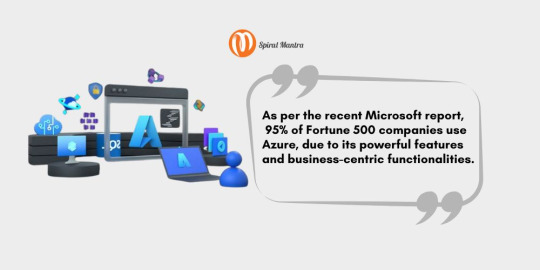
Highlighting Components of Azure DevOps Services at Spiral Mantra
Spiral Mantra is your most trusted DevOps consulting company, tailored to discuss and meet all the possible needs and unique requirements of our potential clients. Our expertise in DevOps consulting services is not only limited to delivering faster results but also lies in offering high-performing solutions with scalability. You can outsource our team to get an upper hand on the industry competition, as we adhere to the following core components:
1. Azure Pipelines: Automates the process of building testing and deployment of code across popular platforms like VMs, containers, or cloud services. CI CD is useful to help developers automate the deployment process. Additionally, it gains positive advantages with fewer errors, resulting in delivering high-quality results.
2. Azure Boards: A power project management tool featuring the process of strategizing, tracking, and discussing work by clasping the development process. Being in touch with us will leverage you in many ways, as our DevOps engineers are skilled enough to make customizations on Azure Boards that fit your project requirements best.
3. Azure Repos: Providing version control tools by navigating teams to manage code effectively. So, whether you prefer to work on GIT or TFVC, our team ensures to implement best version control practices by reducing any risk.
4. Azure Test Plans: In the next step, quality assurance is another crucial aspect of any software or application development lifecycle. It stabilizes to provide comprehensive tools useful for testing while concentrating on the application's performance. We, as the top Azure DevOps consulting company, help our clients by developing robust testing strategies that meet the determined quality standards.
Want to accelerate your application development process? Connect with us to boost your business productivity.
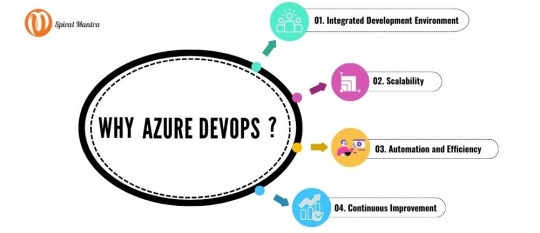
Identifying Your Necessity for Azure DevOps Services
It might be tempting to dive right into what Azure DevOps services you’ll need once you start using it, but there are some important things to be done beforehand. To start with, you’ll have to assess your needs:
Project scale: Is this a small project or an enterprise one? Small teams might want the lightweight solution Azure Repos and Azure Pipelines, while larger teams will need the complete stack, including Azure Boards and Test Plans.
Development language: What language are you developing in? The platform supports many different languages, but some services pair better with specific setups.
CI/CD frequency: How often do you need to publish updates and make changes? If you want to release new builds quickly, use Azure Pipelines, while for automated testing, go with Azure Test Plans.
Collaboration: How large is your development team? Do you have many people contributing to your project? If so, you can go with Azure Repos for version control and, on the other hand, Azure Boards for tracking team tasks.
Choosing the Right DevOps Services in USA
Deciding on the best company for your DevOps requirement can be a daunting task, especially if you have no clue how to begin with. In the following paragraph, get through the need to fulfill while selecting the right agency to make your things work in line.
1. For Version Control
If your project has more than one developer, you’ll probably need enterprise-grade version control so your team can flawlessly work on code. Azure Repos is currently working for both Git and TFVC as the basis for your version control system. If you have a distributed team, then Git is the best choice. If your team prefers working in a centralized workflow, then TFVC may be a little easier. If you’re new to version control, Git is still a pretty good place to start, though. The distributed nature of Git makes it easy for anyone to get up and running with version control.
2. For Automated Tasks (Builds and Deployments)
Building, testing, and using your code in an automated way will keep you going fast and in sync. That’s why running Azure Pipelines on multiple platforms allows CI/CD for any project. The platform also provides the flexibility your team needs to deploy their application to various environments (cloud, containers, virtual machines) as you want your software to be released early and continuously.
3. For Project Management
Now, getting that work done is another thing. A project isn’t just about writing code. Doing release notes requires at least one meeting where you need to understand what’s fixed and what broke. Tracking bugs, features, and tasks helps keep your project on track. Azure Boards provides Kanban boards, Scrum boards, backlogs for managing all your project work, and release boards used to track work for a specific release. You can even adjust it to map to existing workflows used by your team, such as Agile or Scrum.
4. For Testing
Testing is another crucial step to make sure your application behaves as expected with the validation steps or predetermined conditions. You can enable manual testing, exploratory testing, and test automation through Azure Test Plans. This will allow you to integrate testing into your CI/CD pipeline and keep your code base healthy for delivering a more predictable experience to your users.
5. For Package Management
Many development projects use one or more external libraries or packages. Azure Artifacts enables the capture of these dependencies so your team can host, share, and use these packages to build complex projects. It massively reduces the complexity of maintaining a depot of packages so your developers can access them for the development process.
How does the Spiral Mantra Assist? Best DevOps Consulting Company
Spiral Mantra’s expert DevOps services will help you fasten your development process so you can get the most out of the process. Whether it’s setting up continuous integration, a CI CD pipeline, configuring version control, or optimizing any other aspect of your software process through boards or any other aspect of your software process, call Spiral Mantra to make it happen.
Partner with Spiral Mantra, and with our team proficient at using Azure DevOps for small and large projects ranging from your start-up to large teams, you can ensure success for your development projects.
Getting the Most from Azure DevOps
Having found the relevant services, you then need to bring these together. How can you get maximum value out of the service? Here's the process you might consider.
⦁ Azure Repos and Pipelines: To initiate the process, set up version control and automated pipelines to boost the development process.
⦁ Add Boards for Big Projects: Once the team has grown, add Azure Boards for task, bug, and feature request tracking for teams using pull requests.
⦁ Testing Early: Use Test Plans to engage in testing right at the beginning of the CI/CD pipeline and pick up the bugs early.
⦁ Managing Packages with Azure Artifacts: If your project requires more than one library, then set up for Artifacts.
Conclusion
The process of developing software will become easier if you choose the right DevOps consulting company to bring innovations to your business. Spiral Mantra is there to support you with the best DevOps services in USA according to your budding business requirements and provides you with guidance to enhance your workflows of development operations.
1 note
·
View note
Text
Azure’s Evolution: What Every IT Pro Should Know About Microsoft’s Cloud
IT professionals need to keep ahead of the curve in the ever changing world of technology today. The cloud has become an integral part of modern IT infrastructure, and one of the leading players in this domain is Microsoft Azure. Azure’s evolution over the years has been nothing short of remarkable, making it essential for IT pros to understand its journey and keep pace with its innovations. In this blog, we’ll take you on a journey through Azure’s transformation, exploring its history, service portfolio, global reach, security measures, and much more. By the end of this article, you’ll have a comprehensive understanding of what every IT pro should know about Microsoft’s cloud platform.
Historical Overview
Azure’s Humble Beginnings
Microsoft Azure was officially launched in February 2010 as “Windows Azure.” It began as a platform-as-a-service (PaaS) offering primarily focused on providing Windows-based cloud services.
The Azure Branding Shift
In 2014, Microsoft rebranded Windows Azure to Microsoft Azure to reflect its broader support for various operating systems, programming languages, and frameworks. This rebranding marked a significant shift in Azure’s identity and capabilities.
Key Milestones
Over the years, Azure has achieved numerous milestones, including the introduction of Azure Virtual Machines, Azure App Service, and the Azure Marketplace. These milestones have expanded its capabilities and made it a go-to choice for businesses of all sizes.
Expanding Service Portfolio
Azure’s service portfolio has grown exponentially since its inception. Today, it offers a vast array of services catering to diverse needs:
Compute Services: Azure provides a range of options, from virtual machines (VMs) to serverless computing with Azure Functions.
Data Services: Azure offers data storage solutions like Azure SQL Database, Cosmos DB, and Azure Data Lake Storage.
AI and Machine Learning: With Azure Machine Learning and Cognitive Services, IT pros can harness the power of AI for their applications.
IoT Solutions: Azure IoT Hub and IoT Central simplify the development and management of IoT solutions.
Azure Regions and Global Reach
Azure boasts an extensive network of data centers spread across the globe. This global presence offers several advantages:
Scalability: IT pros can easily scale their applications by deploying resources in multiple regions.
Redundancy: Azure’s global datacenter presence ensures high availability and data redundancy.
Data Sovereignty: Choosing the right Azure region is crucial for data compliance and sovereignty.
Integration and Hybrid Solutions
Azure’s integration capabilities are a boon for businesses with hybrid cloud needs. Azure Arc, for instance, allows you to manage on-premises, multi-cloud, and edge environments through a unified interface. Azure’s compatibility with other cloud providers simplifies multi-cloud management.
Security and Compliance
Azure has made significant strides in security and compliance. It offers features like Azure Security Center, Azure Active Directory, and extensive compliance certifications. IT pros can leverage these tools to meet stringent security and regulatory requirements.
Azure Marketplace and Third-Party Offerings
Azure Marketplace is a treasure trove of third-party solutions that complement Azure services. IT pros can explore a wide range of offerings, from monitoring tools to cybersecurity solutions, to enhance their Azure deployments.
Azure DevOps and Automation
Automation is key to efficiently managing Azure resources. Azure DevOps services and tools facilitate continuous integration and continuous delivery (CI/CD), ensuring faster and more reliable application deployments.
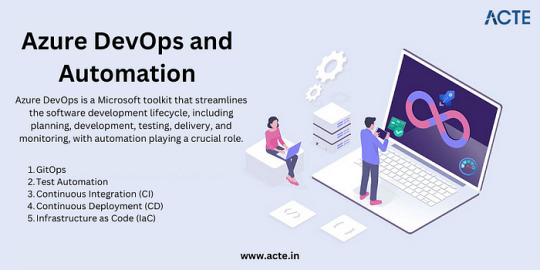
Monitoring and Management
Azure offers robust monitoring and management tools to help IT pros optimize resource usage, troubleshoot issues, and gain insights into their Azure deployments. Best practices for resource management can help reduce costs and improve performance.
Future Trends and Innovations
As the technology landscape continues to evolve, Azure remains at the forefront of innovation. Keep an eye on trends like edge computing and quantum computing, as Azure is likely to play a significant role in these domains.
Training and Certification
To excel in your IT career, consider pursuing Azure certifications. ACTE Institute offers a range of certifications, such as the Microsoft Azure course to validate your expertise in Azure technologies.

In conclusion, Azure’s evolution is a testament to Microsoft’s commitment to cloud innovation. As an IT professional, understanding Azure’s history, service offerings, global reach, security measures, and future trends is paramount. Azure’s versatility and comprehensive toolset make it a top choice for organizations worldwide. By staying informed and adapting to Azure’s evolving landscape, IT pros can remain at the forefront of cloud technology, delivering value to their organizations and clients in an ever-changing digital world. Embrace Azure’s evolution, and empower yourself for a successful future in the cloud.
#microsoft azure#tech#education#cloud services#azure devops#information technology#automation#innovation
2 notes
·
View notes